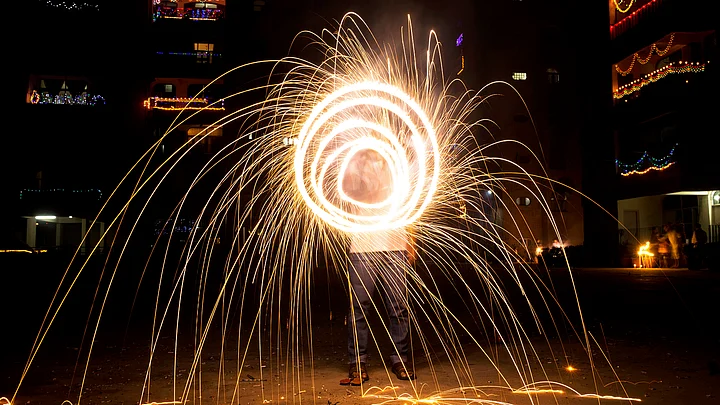As we already grapple with a pandemic caused by a predominantly respiratory infection, the menace of air pollution is knocking at our doors yet again. Concerns regarding deteriorating air during the winter months, coupled with the festive season, are being raised heavily by healthcare experts and policymakers.
In the run-up to Diwali, the plea is to refrain from bursting crackers and avoid any further damage to the air and the environment. ‘Green crackers’ are often suggested as a way out - to celebrate Diwali while minimising this damage.
In October 2018, the Supreme Court lifted the complete ban on the sale of firecrackers and in doing so, had directed that only the sale and use of “safe and green” firecrackers was permitted.
But what are they and do they really work? FIT answers.
What are green crackers?
The definition of a green cracker given in the Supreme Court order from 2018 is one that avoids the usage of ash to reduce particulate matter by 15-20%, has low emissions such that pollutants are reduced by 30-35%, leads to significant reduction in NOx and SO2 and doesn’t have any of the banned chemicals like lead, mercury, lithium, arsenic and antimony.

Will such crackers help reduce pollution?
These reduced pollutants are still pollutants. If the air quality at the time we enter the festive season is already poor and hazardous due to other factors, will these “reduced pollutants” not increase the pollution levels? We’re already at a point where air quality has worsened. Releasing any more amount of pollutants will not be “safe”.
Even if crackers are burst only for two hours and on one day but by millions of people, it’s still expected to sharply decrease air quality. Yes, it’ll reduce the effect to some extent, but is that enough?
Could green crackers have an adverse impact on our health?
Dr Rajesh Chawla, senior pulmonologist at Apollo Hospital, told FIT,
“Maybe the pollutants will be less but the smoke and dust will still be there. You cannot reduce that and overall adverse effect of crackers will still be there. Any cracker which emits smoke and dust will impact the health of people.”Dr Rajesh Chawla

Any kind of sudden release of air pollutants causes an acute spike in health issues. It massively affects children, the elderly and people with respiratory problems. Kids are born with compromised lungs.
And for the rest of the population as well this kind of air pollution is known to increase risk of cancer, diabetes, and cause respiratory and cardiovascular diseases.
Except on festive days like Diwali, Christmas and New Year, there’s no time limit to burst these crackers on other days around the year and at occasions like weddings.
“Why can’t the SC ban crackers? We are fighting so many problems and see so many people suffering because of this. There are other ways to celebrate.”Dr Rajesh Chawla
We’re at a point where we can’t afford any further worsening of air pollution. So, if we can control even one factor that is increasing this pollution, why are we not doing so effectively?
States in India are making their own rules with respect to firecrackers this year. What’s allowed in Delhi?
Rajasthan Chief Minister Ashok Gehlot announced on Monday a ban on the sale and bursting of firecrackers during the festive season in the wake of Covid-19.
He also directed to take strict action against the sale of firecrackers and fireworks in the state, PTI reported. In a situation like this, people should avoid using fireworks on Diwali, he said.
The Delhi government also notified on Thursday, a ban on all crackers, including green crackers from 7 November to 30 November amid rising pollution levels and a spike in COVID-19 cases in the national capital.
Chief Minister Arvind Kejriwal said in a tweet, Reviewed corona situation in Del n preparedness wid Chief Secy, Health officials and all DMs. Corona cases hv increased due to festival season n pollution. It was decided to 1. Ban crackers in Delhi 2. Ramp up medical infrastructure, oxygen and ICU beds are being increased in Delhi govt hospitals 3. Del HC has stayed our order to increase ICU beds in private hospitals. Filed appeal in SC yesterday. We hope SC will lift the stay keeping in view the critical situation 4. Targetted testing 5. All steps shud be taken to ensure that fatality rate does not increase.”
(At The Quint, we question everything. Play an active role in shaping our journalism by becoming a member today.)
